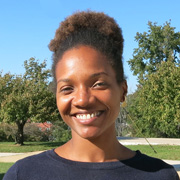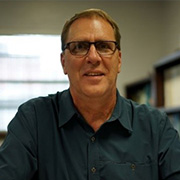Resilience and Sustainability Plenary
Thursday, April 25, 2019
8:30am – 10:00am
Moderator:
Dr. Nick Aumen, Regional Science Advisor – South Florida, USGS, Davie, FL
Session Schedule
8:35am
Opening Remarks
8:45am
Dr. Lola E. Fatoyinbo-Agueh, Research Physical Scientist, Earth Sciences Remote Sensing, National Aeronautics and Space Administration (NASA) — Gradients in Mangrove Forest Structure and their Relationship to Climate, Geomorphology and Human Influence
9:20am
Dr. Karl Havens, Executive Director, Florida Sea Grant College Program, Gainesville, FL — Blooms, Nutrients and Climate Change: What’s in the Future for Florida Lakes and Estuaries?
9:45am
Open Discussion and Q&A with Attendees
10:00am
Session Concludes
Speakers

Dr. Temilola (Lola) Fatoyinbo-Agueh
Research Physical Scientist
Dr. Temilola (Lola) Fatoyinbo-Agueh is a Research Physical Scientist in the Biospheric Sciences Lab at NASA GSFC where she studies forest ecology and ecosystem structure using active remote sensing instruments. Lola received her Doctorate in Environmental sciences in 2008 with a focus on forest ecology of tropical wetlands. After her Ph.D, she received a NASA postdoctoral program fellowship at the Radar Science and Engineering Section at JPL, where her primary research focus was on using interferometric radar data to quantify tropical forest extent, height and biomass through the development of radar-lidar fusion algorithms.
In 2010, Dr. Fatoyinbo joined Goddard’s Biospheric Sciences Laboratory. Her current research focus is the fusion of optical, SAR and lidar data to quantify forest structure, biomass, extent and degradation. She is the Principal Investigator on the P-band EcoSAR SAR instrument and PI/CO-I on several other NASA-funded projects. In 2012 she was the recipient of the Presidential Early Career Award in Science and Engineering for her efforts on merging scientific priorities with advanced technology to develop innovative remote-sensing instrumentation for carbon-cycle and ecosystems science.

Dr. Karl Havens
Director, Professor
Dr. Karl Havens is Director of the Florida Sea Grant Collage Program at the University of Florida, where he also is a Professor in Fisheries and Aquatic Sciences. He holds a PhD in Biology from West Virginia University, and has been on the faculty of the University of Pennsylvania, Kent State University, and he was Chief Environmental Scientist for 12 years at the South Florida Water Management District.
His research examines how natural and anthropogenic stressors affect lake ecosystems, with a focus on the structure and function of their food webs. His most recent research examines how climate variation and change affect lakes, in particular cyanobacterial harmful algal blooms. He also actively disseminates information to lay audiences, particularly work related to algae blooms.
Dr. Havens has 25 years of experience working with Lake Okeechobee, was a member of the CERP Restudy team, and currently is a member of the Committee on Independent Scientific Review of Everglades Restoration Progress of the NASEM. He has published over 150 peer-reviewed journal articles in his area of expertise, several book chapters and a number of books related to topics ranging from shallow lakes to the global water crisis. His approach to research now is to use existing data to identify patterns that can generate hypotheses to fuel experimental research, and ranges from using local data in Florida to data from hundreds of lakes around the world in multi-investigator collaborative studies.
